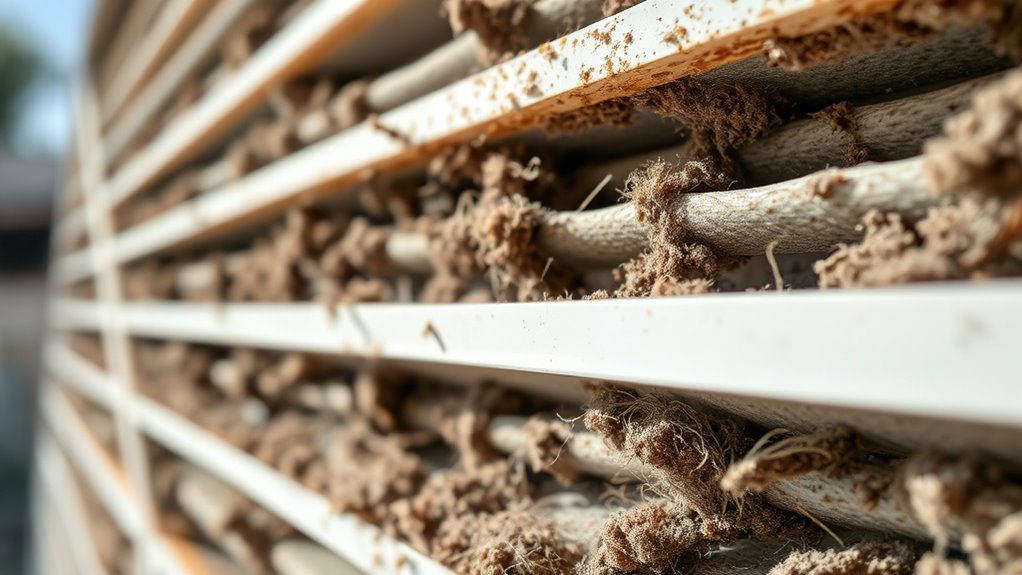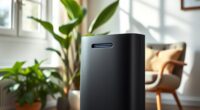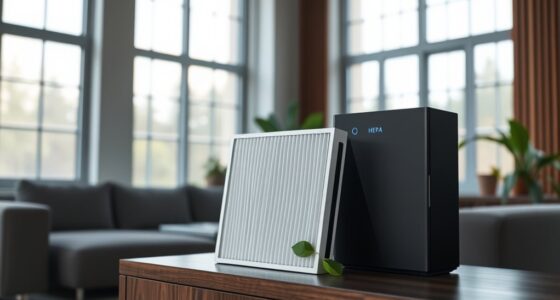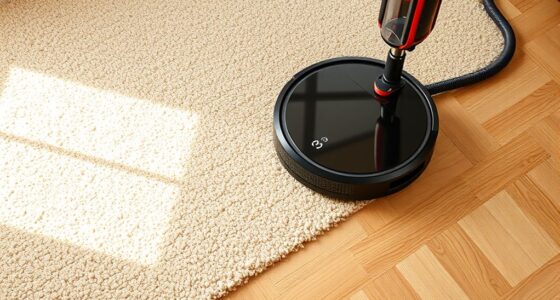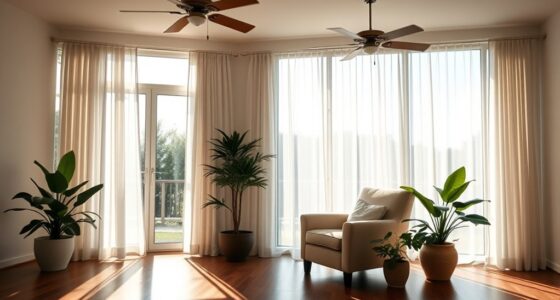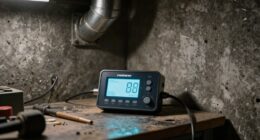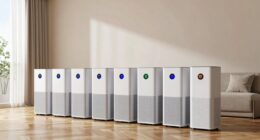Skipping your AC filter change lets mold, bacteria, and allergens build up, which can seriously harm your health and worsen allergies. Dirty filters cause poor air quality, mold growth, and foul odors, while also making your HVAC work harder and wear out faster. If you neglect regular replacements, you risk long-term damage and costly repairs. To learn more about why this simple task is essential, keep going for the full details.
Key Takeaways
- Mold and mildew thrive on neglected filters, releasing spores that worsen allergies and cause respiratory infections.
- Dirty filters harbor bacteria and germs, increasing microbial risks and contaminating indoor air quality.
- Clogged filters force HVAC systems to work harder, leading to higher energy bills and potential long-term damage.
- Accumulated debris and mold produce foul odors, making your home smell stale and unclean.
- Skipping filter changes allows allergens, dust, and pet dander to circulate, triggering health issues like coughing and nasal congestion.
The Hidden Growth of Mold and Mildew
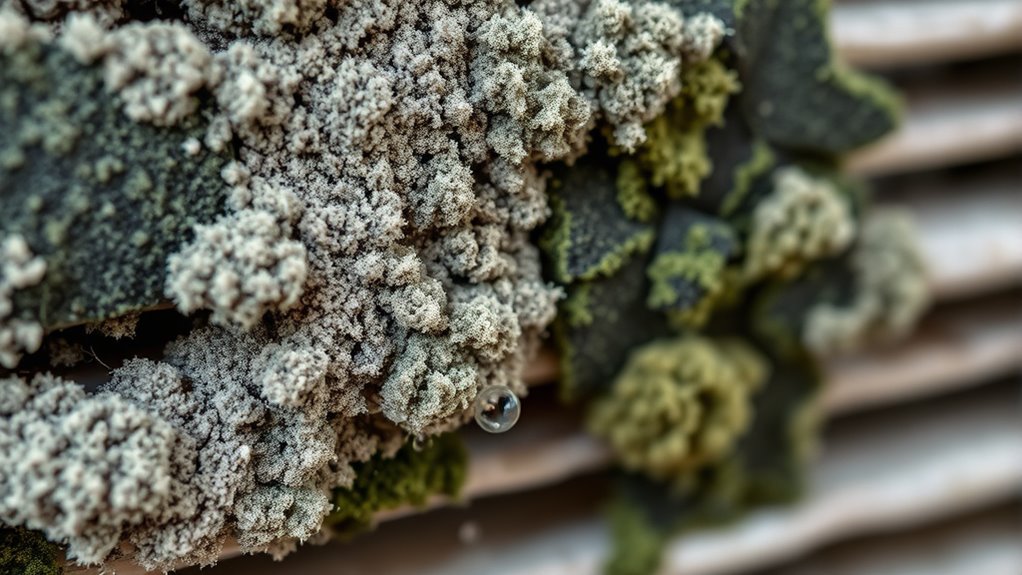
Even if you rarely notice it, mold and mildew can secretly thrive in your AC system if you neglect to change the filter. Poor air filter maintenance creates the perfect environment for mold growth, as dampness and organic debris build up on dirty filters. Mold spores can settle and multiply, releasing microscopic particles into your home’s air. This not only worsens indoor air quality but also risks mold-related health problems. Regularly replacing or cleaning your air filter is essential for mold prevention. It stops mold spores from circulating and prevents the moist, contaminated environment that mold needs to grow. Additionally, a well-maintained filter helps prevent the buildup of organic debris, which can further contribute to mold development. Staying on top of filter maintenance isn’t just about efficiency; it’s a vital step to keep mold at bay and maintain healthier indoor air.
How Dirty Filters Circulate Allergens
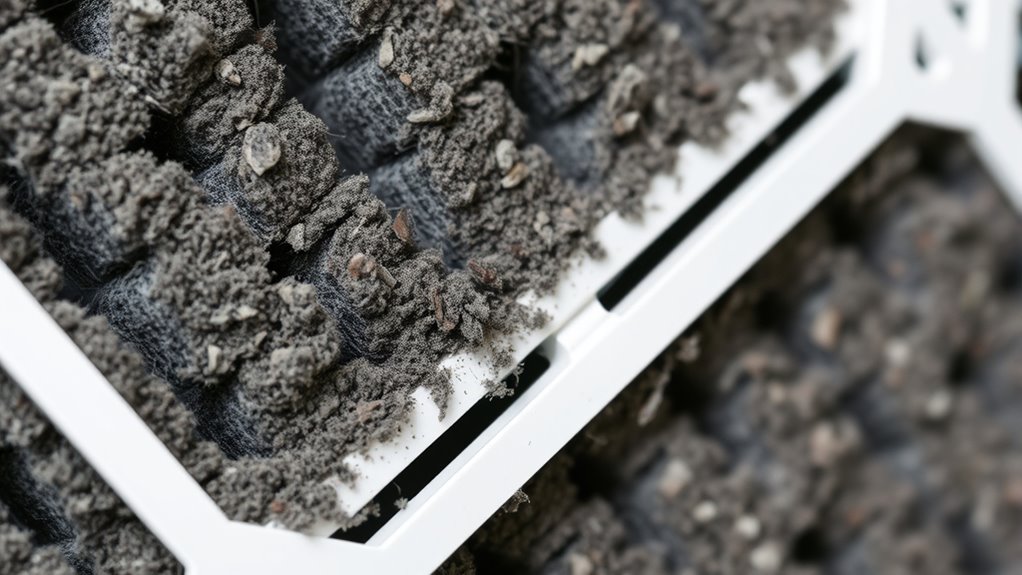
When your AC filter becomes clogged with dirt, dust, and debris, it doesn’t just reduce airflow; it also becomes a vehicle for circulating allergens throughout your home. Airflow restriction forces your system to work harder, pushing more allergens trapped in the filter material into the air you breathe. Over time, the buildup of particles like pollen, pet dander, and dust mites can be released back into your living space, aggravating allergies and respiratory issues. A dirty filter loses its ability to trap these allergens effectively, turning it into a source of contamination instead of protection. Regularly changing your filter guarantees better airflow, prevents allergens from circulating freely, and keeps your indoor environment healthier and more comfortable.
The Impact on Indoor Air Quality
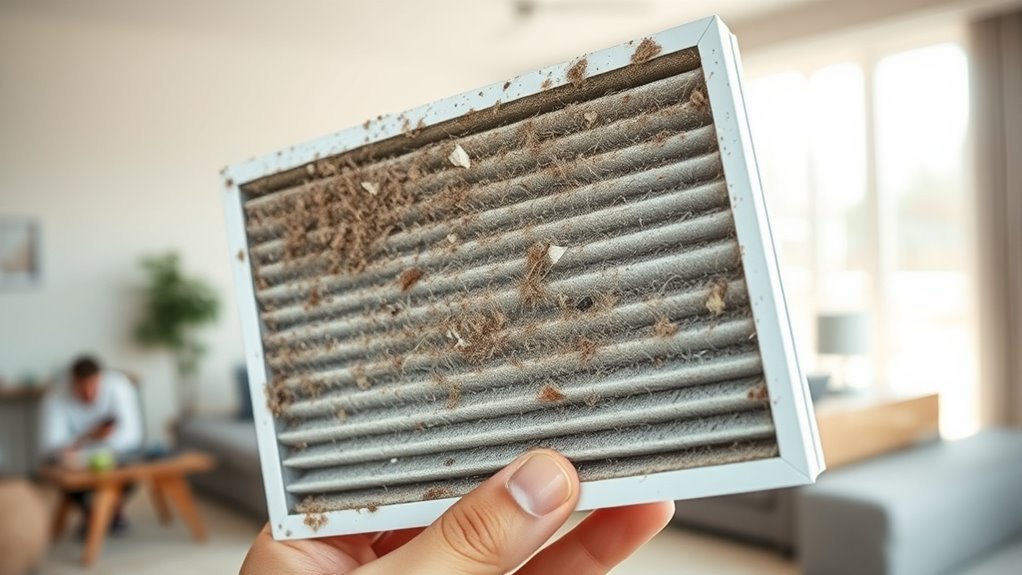
A clean AC filter plays an essential role in maintaining healthy indoor air quality. When you change your filter regularly, you prevent dust, pollen, and pollutants from recirculating, ensuring cleaner air inside your home. Poor filter maintenance allows contaminants to build up, reducing air quality and potentially causing respiratory issues. To help you understand, here’s a quick comparison:
| Good Filter Maintenance | Poor Filter Maintenance |
|---|---|
| Fresh, clean air | Dusty, polluted air |
| Reduced allergens | Increased allergens |
| Better HVAC efficiency | Higher energy bills |
Regular filter changes keep your air fresh and safe, protecting your home’s environment and your health. Neglecting this simple step can considerably compromise indoor air quality. Proper airflow around the unit and adhering to manufacturer guidelines are crucial for optimal performance.
Bacteria and Germs That Thrive on Neglected Filters
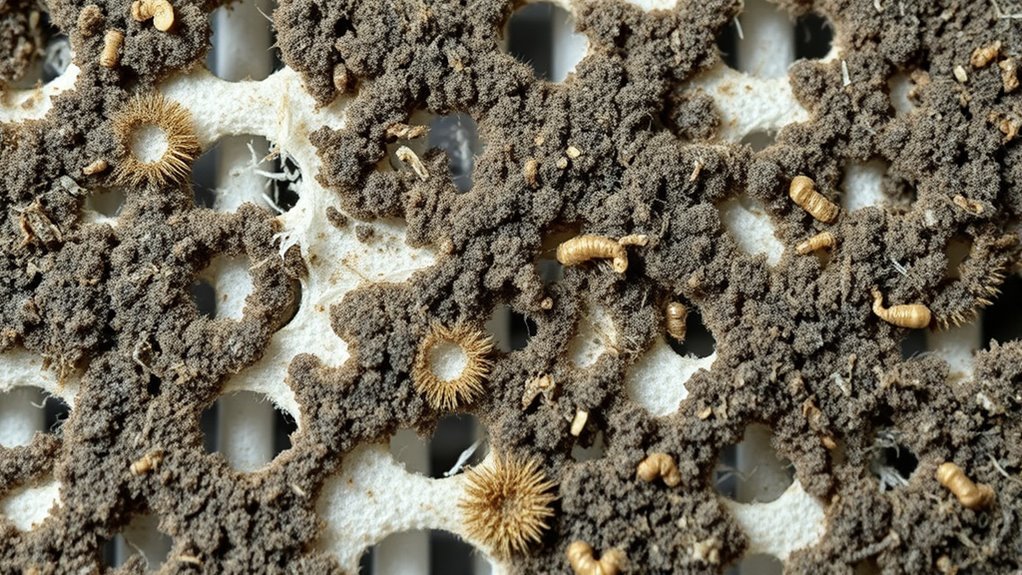
Neglecting to change your AC filter creates a perfect environment for bacteria and germs to thrive. Over time, airborne bacteria settle into the filter, where they multiply and build up. This germ buildup can release into your indoor air whenever the system runs, spreading bacteria throughout your home. A dirty filter doesn’t just trap dust; it becomes a breeding ground for microbes, including mold spores and bacteria that can cause allergic reactions or infections. The longer you go without changing it, the greater the risk of these harmful germs circulating in your living space. Regularly replacing your filter prevents germ buildup, keeping airborne bacteria in check and maintaining a healthier environment for you and your family. Additionally, filter maintenance is essential for optimal HVAC performance and energy efficiency.
Increased Risk of Respiratory Issues
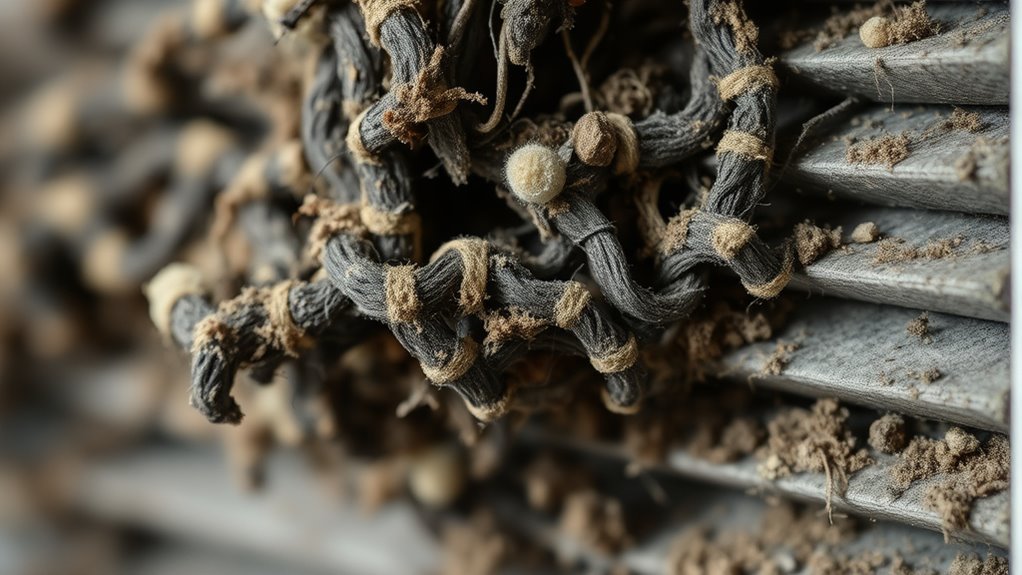
When you skip changing your AC filter, dust and allergens build up, making it harder to breathe comfortably. Mold can grow on the dirty filter, releasing spores into your home’s air and increasing health risks. As a result, your respiratory system faces more strain, and breathing difficulties become more likely. Regular filter changes also help maintain indoor air quality, reducing the presence of pollutants that can exacerbate respiratory issues.
Allergens in Dust
Dust that accumulates in your AC filter often contains allergens like pollen, pet dander, and mold spores, which can easily circulate throughout your home. These particles, especially dust mites and pet dander, can trigger allergic reactions and worsen respiratory issues. When your filter isn’t changed regularly, these allergens build up and get blown into the air you breathe. This can lead to sneezing, coughing, asthma flare-ups, and other breathing problems, particularly if you’re sensitive or have existing conditions. Keeping your filter clean reduces the amount of airborne allergens, ensuring better air quality and healthier lungs. HEPA filtration is highly effective at capturing even the tiniest particles, further improving your indoor air. Don’t overlook how often changing your AC filter helps keep allergens out of your home and your respiratory system safe. Regular maintenance is key to breathing easier.
Mold Growth Risks
If your AC filter isn’t changed regularly, dust and moisture can create the perfect environment for mold to grow. Mold thrives on organic material found in certain air filter materials, especially if moisture is present. Over time, mold spores can develop on the filter, then circulate through your home whenever the AC runs. This can considerably increase your risk of respiratory issues, especially for sensitive individuals. Sticking to a consistent filter replacement schedule helps prevent mold buildup and keeps indoor air cleaner. Using filters designed with mold-resistant materials can provide extra protection. Neglecting to change your filter allows mold to flourish, which can lead to health problems and worsen existing respiratory conditions. Regular maintenance is essential for healthier indoor air quality. Understanding mold growth can help you take proactive steps to protect your home environment.
Breathing Difficulties Increase
Neglecting to change your AC filter regularly allows airborne particles and pollutants to circulate freely, making it harder to breathe comfortably. Poor air quality can worsen allergy symptoms and increase respiratory issues. When filters are dirty, allergens like dust, pet dander, and mold spores accumulate, triggering breathing difficulties. You might notice:
- Increased coughing or wheezing
- Shortness of breath during activities
- More frequent allergy flare-ups
- Persistent nasal congestion
These symptoms are signs that your lungs are working harder to filter out irritants. Over time, poor indoor air quality can lead to chronic respiratory problems. Keeping your filter clean ensures better airflow, reduces airborne allergens, and helps you breathe easier every day. Additionally, data privacy concerns in air filtration systems highlight the importance of secure and compliant technology. Don’t ignore your filter—your lungs will thank you.
The Connection Between Dirty Filters and Allergic Reactions
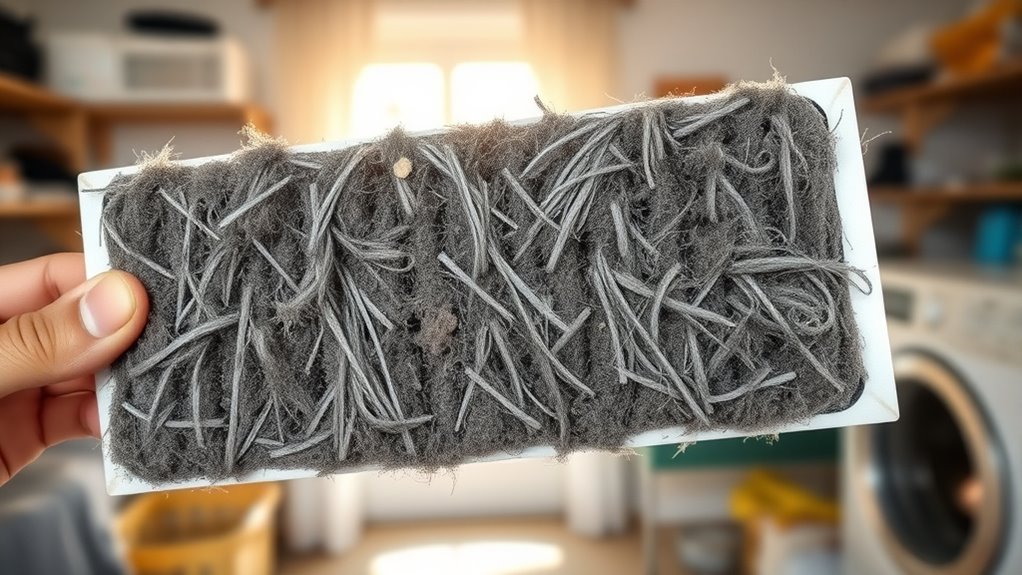
A dirty AC filter can circulate more allergens like dust, pollen, and pet dander, making allergy symptoms worse. This buildup also irritates your respiratory system, leading to discomfort and breathing difficulties. Plus, mold can grow on a clogged filter, further aggravating allergic reactions and health issues. Using an air purifier with HEPA filters can help reduce these airborne pollutants and improve indoor air quality.
Increased Allergen Circulation
When your AC filter becomes dirty, it no longer effectively traps airborne allergens like dust, pollen, and pet dander. Instead, these particles circulate throughout your home, increasing allergen levels. Over time, the accumulation of debris on air filter materials hampers airflow and reduces filtration efficiency. This causes allergens to bypass the filter entirely, worsening indoor air quality. To prevent this, follow proper replacement schedules based on your filter type and usage. Regularly changing your filter helps maintain ideal airflow and reduces allergen circulation. Keep in mind:
- Dirty filters trap fewer allergens, allowing them to recirculate
- Poor airflow can spread airborne irritants
- Using the right filter material improves allergen capture
- Timely replacements prevent allergen buildup and circulation
- The effectiveness of your AC system depends on filtration efficiency and proper maintenance.
Sticking to your replacement schedule ensures allergens stay out of your indoor environment.
Respiratory Irritation Risks
Dirty filters don’t just reduce airflow—they can also pose direct health risks by increasing respiratory irritation. When filters are clogged with dust, dirt, and debris, they struggle to trap airborne particles effectively. As a result, poor air quality circulates through your home, exposing your respiratory system to irritants like pollen, pet dander, and mold spores. This can trigger symptoms such as coughing, sneezing, wheezing, and sore throats, especially if you have allergies or asthma. Over time, breathing in contaminated air can worsen respiratory health, making it harder to breathe comfortably. Regularly changing your AC filter helps maintain clean airflow, reducing respiratory irritation and supporting better air quality for you and your family. Proper filter maintenance also helps prevent the buildup of dust and debris, which can further impair air quality and exacerbate respiratory issues.
Mold Growth Potential
If you neglect to change your AC filter regularly, mold can start to grow on the accumulated dust and debris. This creates a breeding ground for mold spores, which can become airborne spores that circulate throughout your home. As mold develops, allergen buildup increases, making allergy symptoms worse. The longer you wait, the higher the risk of exposure to these harmful spores.
- Mold thrives in damp, dirty filters, releasing airborne spores.
- Dust and debris act as nutrients for mold growth.
- Increased allergen buildup worsens allergy and asthma symptoms.
- Poor airflow caused by dirty filters encourages mold proliferation.
The Hidden Cost of Reduced HVAC Efficiency
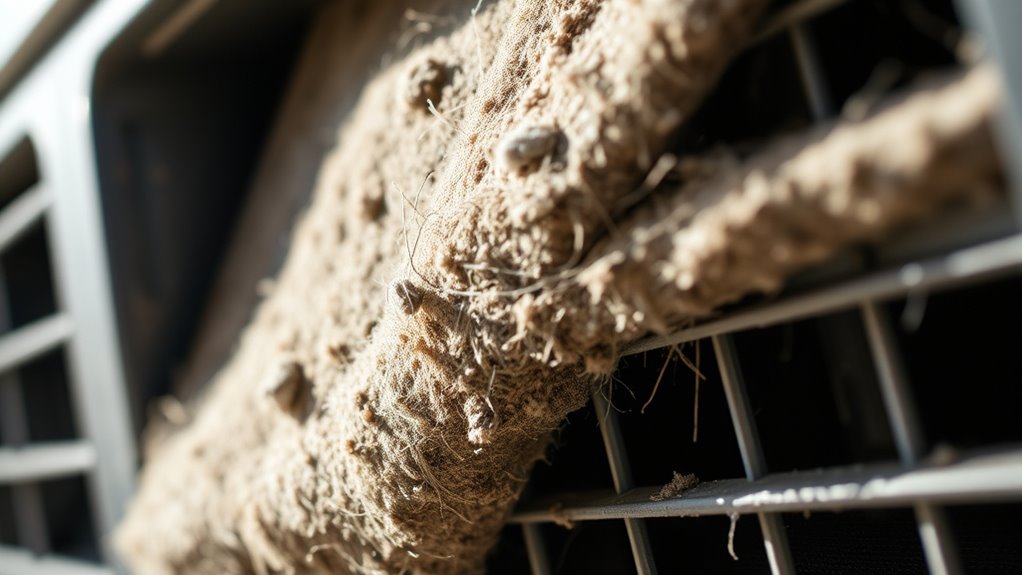
Neglecting to change your AC filter can silently raise your energy bills by making your HVAC system work harder than necessary. When the filter is clogged, airflow decreases, forcing your system to run longer and consume more energy. Over time, this inefficiency erodes your potential for energy savings, leading to higher utility costs. Additionally, the extra strain accelerates wear and tear on your equipment, shortening its lifespan. You might find yourself replacing costly components or even the entire system sooner than expected. Regularly changing your filter helps maintain ideal airflow, ensuring your HVAC operates smoothly and efficiently. By doing so, you protect your investment, lower energy bills, and extend the life of your equipment. It’s a simple step with significant long-term benefits.
The Potential for Unpleasant Odors
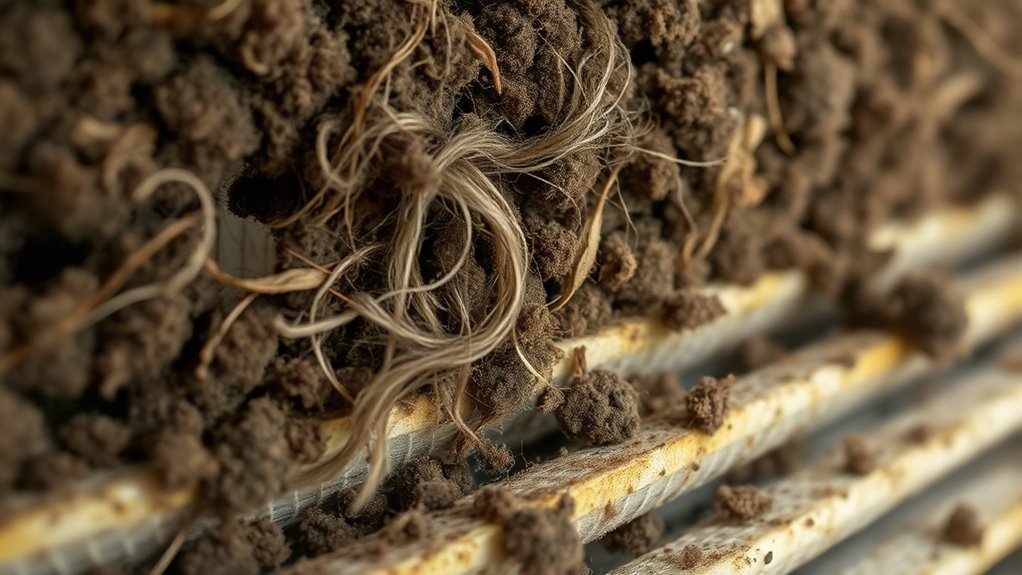
When you skip changing your AC filter, unpleasant odors can quickly develop inside your home. Mold, dust, pet dander, and bacteria accumulate on a dirty filter, releasing foul smells when the system runs. To combat this, consider air freshener alternatives like natural essential oils or activated charcoal bags, which help neutralize odors without masking them. Maintaining a consistent filter replacement schedule prevents these smells from taking hold and keeps your indoor air fresh. Neglecting this maintenance can lead to stale, musty odors that linger and worsen over time. Remember, a clean filter not only improves air quality but also prevents the buildup of odor-causing agents. Regular filter changes are essential for a fresh, welcoming environment you’ll enjoy every day.
Long-Term Damage to Your HVAC System
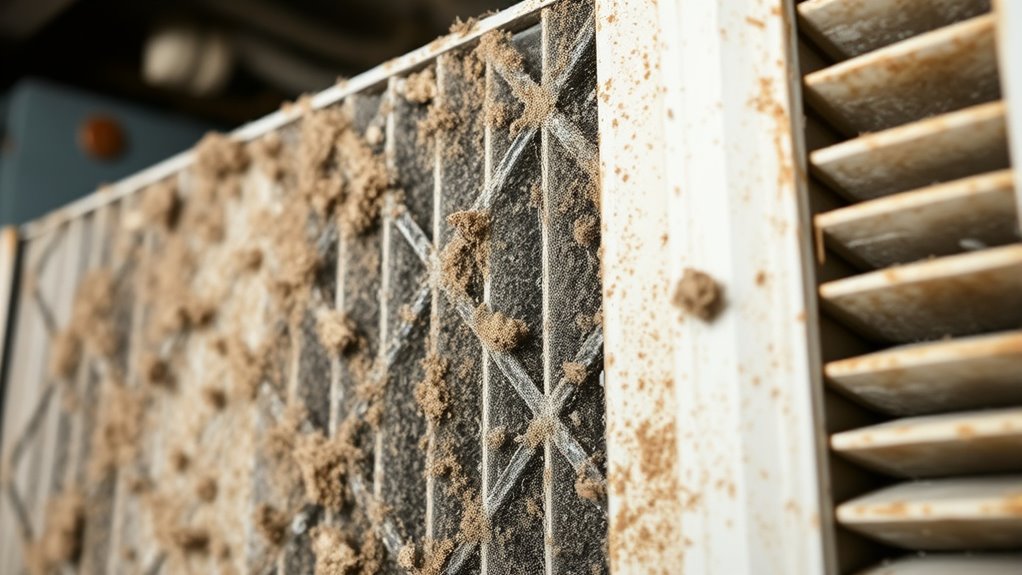
A dirty AC filter forces your system to work harder than necessary, putting unnecessary strain on its components. Over time, this overload can cause motor parts to wear out prematurely and reduce overall efficiency. The filter material becomes clogged, restricting airflow and forcing your HVAC system to run longer, which accelerates component fatigue. Ignoring filter lifespan can lead to costly repairs or replacements. To prevent long-term damage, replace your filter regularly based on its material and usage.
| Filter Material | Typical Lifespan | Consequences of Neglect |
|---|---|---|
| Fiberglass | 30-60 days | Reduced airflow, system strain |
| Pleated | 60-90 days | Increased energy bills, wear |
| Electrostatic | 90-120 days | Shortened lifespan, breakdown risk |
| Washable | 3-6 months | Clogging, system inefficiency |
| HEPA | 6-12 months | Dust buildup, motor stress |
Frequently Asked Questions
How Often Should I Change My AC Filter for Optimal Health?
You should change your AC filter regularly to maintain ideal air quality and extend its lifespan. Typically, doing so every 1 to 3 months works well, but if you have allergies, pets, or live in a dusty area, you might need to replace it more often. Regular changes ensure your system runs efficiently, keeps your indoor air clean, and prevents costly repairs. Don’t wait too long—your health depends on it.
Can a Dirty Filter Cause My HVAC System to Break Down?
Did you know that a dirty filter can decrease your HVAC system’s lifespan by up to 15%? When your filter gets clogged, airflow drops, causing your system to overwork and overheat. This not only risks breakdowns but also worsens air quality inside your home. Changing your filter regularly helps maintain proper airflow, extends filter lifespan, and keeps your system running smoothly, saving you money and ensuring better indoor air quality.
What Signs Indicate My Filter Needs Replacing Sooner?
You’ll want to replace your filter sooner if you notice discoloration or odd odors. Discolored filters often look dirty or darkened, indicating buildup that hampers airflow. Odd smells, like mustiness or burning scents, also signal it’s time for a change. These signs show your filter is clogged or contaminated, which can strain your system and impact air quality. Don’t wait—changing your filter promptly keeps your AC running efficiently and helps maintain a healthy home environment.
Are There Health Risks Associated With Long-Term Filter Neglect?
Ignoring your AC filter can dangerously degrade your respiratory health. Long-term neglect allows indoor allergens like dust, mold, and pet dander to accumulate, increasing allergy symptoms and risking respiratory issues. You might experience persistent coughing, sneezing, or worsened asthma. Regular filter changes prevent these health hazards, ensuring cleaner air and safer breathing. Don’t delay—protect your respiratory health by maintaining a fresh, functional filter.
How Does Filter Maintenance Affect Energy Bills?
When you maintain your filter, you improve air quality and extend its lifespan, which helps your energy bills stay lower. A clean filter allows your AC to run more efficiently, using less energy to cool your space. Neglecting filter maintenance causes strain on your system, increasing energy consumption and costs. So, regular filter changes not only safeguard your health but also save you money on energy bills.
Conclusion
Skipping your AC filter might save a few bucks now, but ironically, it costs you more in health, odors, and repairs later. That dirty filter quietly fosters mold, bacteria, and allergens, turning your home into a germ factory. So, while it seems harmless to skip it, neglecting regular changes actually shortens your system’s life and your breath’s quality. Don’t wait for the smell or breakdown—your wallet and lungs will thank you.
